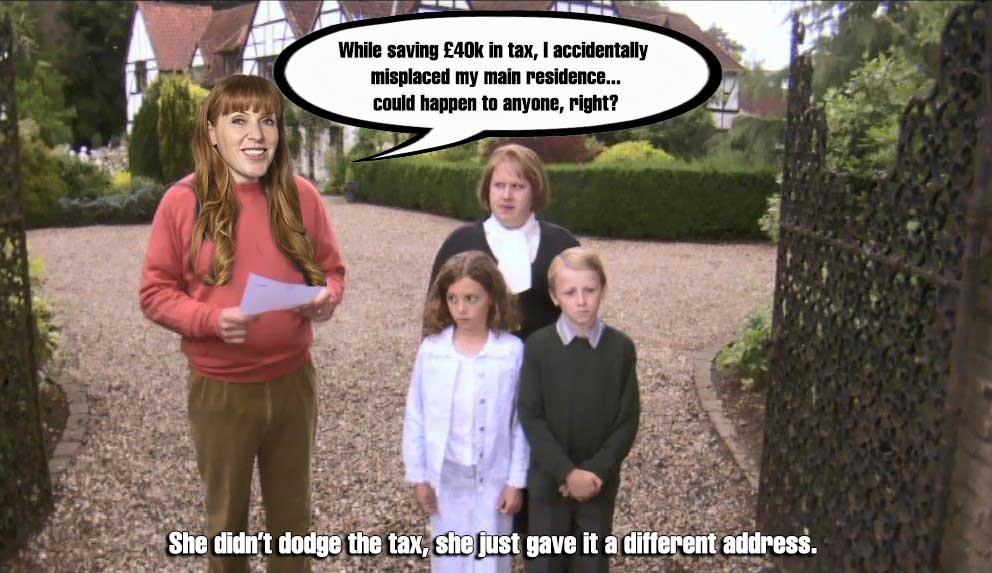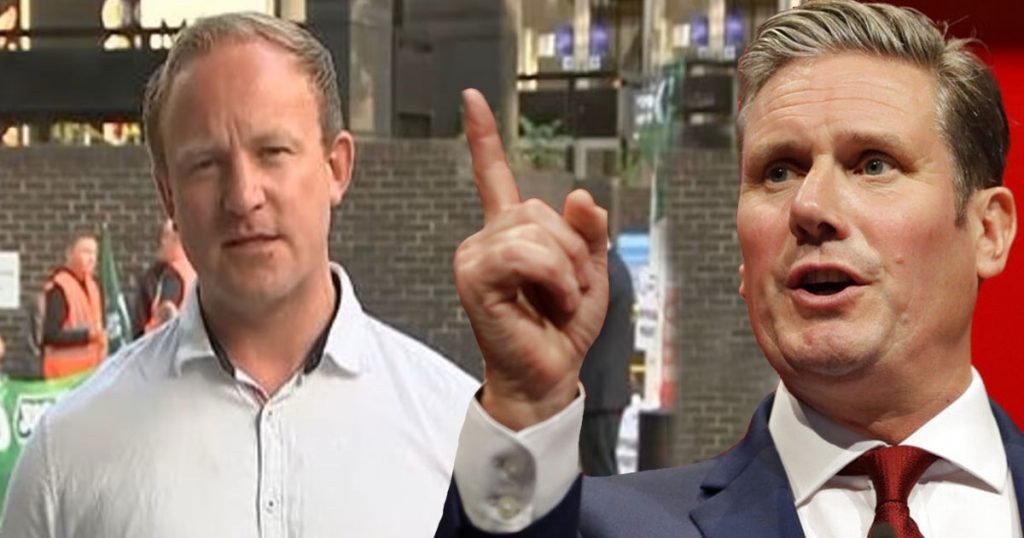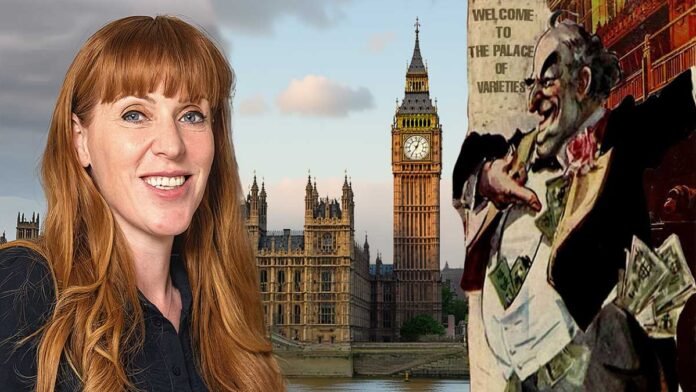The Hollow Ring of Virtue
Is there anything more tiresome than a politician’s confession? It is a performance as predictable and theatrical as a Punch and Judy show, where the sinner, having been found out, steps forward not to repent but to manage the fallout. The words are always the same: “I take full responsibility.” “Mistakes were made.” “I have now referred myself to the proper authorities.” These aren’t confessions; they are legal disclaimers wrapped in the cloak of contrition.
And so it is with Angela Rayner, a politician who has, until now, built a public persona around a powerful, almost brutal authenticity. The working-class girl from a council estate, now the Deputy Prime Minister, standing for the little guy against a system rigged by the rich. This, we were told, was a story of triumph. Yet, as the press circle like vultures over her personal finances, the narrative begins to sour. We now hear that she has admitted to not paying the full stamp duty on a property in East Sussex, a saving of some £40,000. She calls it a mistake, the result of bad advice. A court-ordered trust for a sick son is trotted out as an extenuating circumstance. It is a carefully constructed defence, designed to make her not a tax dodger, but a victim of circumstance, a hapless innocent caught in the Kafkaesque tangle of property law.
But what an extraordinary tangle it is. She told the local council her Hove flat was a second home, incurring a higher council tax. Yet, for the purposes of avoiding stamp duty, she was, in effect, arguing it was her main residence. Now, we are told, the legal advice she received on this was “inaccurate.” We are left with a simple question: in the dizzying dance of official forms and legalistic fine print, was she a tax-paying citizen or a politician seeking to mitigate her personal costs? The answer, it seems, changed depending on which body she was communicating with.

This is not a story about one politician’s transgression. It is a story about the corrosive hypocrisy at the heart of our public life. For decades, the progressive left has rightly campaigned against tax avoidance, exposing the offshore schemes and labyrinthine trusts of the super-rich. They have argued, with moral clarity, that a nation’s health and schools and roads depend on everyone paying their fair share. The stamp duty on a second home is not some arcane tax; it is a straightforward levy designed to cool a runaway housing market and generate revenue for the public good. For a politician whose brief is housing policy to be caught out on this very matter is not just an error of judgment; it is a betrayal of the principle she purports to represent.
The Trust Fund Defence

Rayner’s explanation centres on a court-mandated trust established for her son following an injury. Her legal advisers, she claims, gave her incorrect guidance about her stamp duty obligations. This defence deserves scrutiny not for its legal merits, which appear genuine, but for what it reveals about the widening gulf between political elites and ordinary citizens.
Consider the practical reality: Rayner possessed sufficient wealth to purchase an £800,000 property whilst maintaining another home, employed expensive legal counsel, established complex trust arrangements, and now casually mentions contacting HMRC to settle outstanding tax obligations. This is the lived experience of Britain’s political class, a world of multiple properties, trust funds, and legal advisers on tap.
Yet Rayner simultaneously presents herself as the champion of Britain’s housing crisis, the minister who will tackle affordability and ensure ordinary families can access decent homes. The cognitive dissonance is jarring. How can someone so embedded in property wealth credibly address the concerns of families priced out of homeownership entirely?
The historical echo. This is not the first time a politician has been hobbled by the prosaic details of their personal affairs. The ghosts of expense scandals past, from moats to duck houses, whisper of a similar truth: the public does not forgive what it perceives as a disconnect between a politician’s lofty rhetoric and their grubby reality. The public will tolerate a leader who is flawed, perhaps even one who is amoral. But they will not tolerate a leader who claims to be one thing in public while quietly benefiting from a system they rail against in private. The sin is not merely the saving of money; the unforgivable offence is the sanctimony that accompanies it.
The most generous counterargument is that her mistake was genuinely innocent, an honest error in a complex system. She has, after all, referred herself to the authorities and promised to pay what is owed. This is presented as proof of her integrity. But this line of reasoning is a flimsy shield. But the reality is that, only came after a media investigation. You do not need to be a villain to be a hypocrite. The question is not whether she intended to break the law; there is no suggestion that she has, but whether her personal conduct aligns with her political creed. It is a question of character, and the facts do not offer a flattering answer. She benefited from a loophole, however unintentionally. Now that she has been exposed, she makes good on the debt. This is not principled behaviour; it is crisis management.
And what of the new revelations? Her partner, a former Labour MP, now works for a lobbying firm that has secured a significant government grant for a client. The firm works in her ministerial department. She has previously promised to crack down on such arrangements. Here the ethical landscape becomes even murkier. We are told there is no conflict of interest. Yet, the smell of it hangs in the air like cheap perfume. It is a familiar stench in the corridors of power, the mingling of public duty and private gain. The line between them is not so much a boundary as a suggestion, easily blurred by the soft-focus lens of modern political life.

The system is not broken; it is working precisely as it was designed to. It is a system in which the powerful, regardless of their political stripe, are held to a different standard. They navigate a world of expert counsel and legal trusts, a world where the complexities of tax law can be weaponised for personal gain, and where a partner’s lobbying work can exist in a discreet, unmentioned sphere. Meanwhile, the rest of us are left to struggle through the opaque rules of everyday life with no such counsel and no such trusts.
The broader context makes this even more damaging. Labour’s credibility rests on its claim to represent ordinary working families against an elite that plays by different rules. When Rayner buys an £800,000 seaside apartment while presiding over a housing crisis, when her partner’s lobbying connections blur the lines between private interest and public service, that credibility suffers potentially fatal damage.
But this is not merely about Angela Rayner, it is about what we on the left are prepared to tolerate from our own. For too long, progressive politics has been undermined by a tribalism that excuses behaviour in our allies that we would rightly condemn in our opponents. This reflexive defensiveness has cost us dearly, allowing our enemies to paint us as hypocrites while we tie ourselves in knots defending the indefensible.

The lobbying allegations surrounding Sam Tarry add another layer of concern. Henham Strategy’s client securing almost £300,000 in government funding while Rayner oversees the relevant department creates, at minimum, an appearance of impropriety that no amount of legal hair-splitting can dispel. In an era when public trust in politics hangs by a thread, appearances matter as much as realities.
Some will argue that focusing on such matters plays into Tory hands, that we should direct our fire at the real enemies of progress. This misses the point entirely. The real enemy of progress is the erosion of public faith in politics itself. When voters conclude that all politicians are essentially the same, self-serving, rule-bending, excuse-making, they retreat from democratic engagement altogether. The right thrives in that vacuum.
The time for pious platitudes has long passed. We must demand more from those who seek to govern us. The current spectacle is a sad farce, a pantomime of accountability that offers no real scrutiny and no genuine reform. We need not be a nation of saints, but we must be a nation where the rules apply to all, and where those who set the rules are the first to follow them. The only path forward is a fundamental overhaul of the rules governing ministerial conduct and personal finances. It is a call not for political revenge, but for a simple, universal demand: that those who aspire to lead must first demonstrate they can live by the very principles they expect of the people they serve. Anything less is not just a mistake; it is a mockery.
Support Independent Journalism Today
Our unwavering dedication is to provide you with unbiased news, diverse perspectives, and insightful opinions. We're on a mission to ensure that those in positions of power are held accountable for their actions, but we can't do it alone. Labour Heartlands is primarily funded by me, Paul Knaggs, and by the generous contributions of readers like you. Your donations keep us going and help us uphold the principles of independent journalism. Join us in our quest for truth, transparency, and accountability – donate today and be a part of our mission!
Like everyone else, we're facing challenges, and we need your help to stay online and continue providing crucial journalism. Every contribution, no matter how small, goes a long way in helping us thrive. By becoming one of our donors, you become a vital part of our mission to uncover the truth and uphold the values of democracy.
While we maintain our independence from political affiliations, we stand united against corruption, injustice, and the erosion of free speech, truth, and democracy. We believe in the power of accurate information in a democracy, and we consider facts non-negotiable.
Your support, no matter the amount, can make a significant impact. Together, we can make a difference and continue our journey toward a more informed and just society.
Thank you for supporting Labour Heartlands









